Indexing Stephen Harper .. man from new west and old Canada (and empire on which sun never set)?
May 25th, 2007 | By Citizen X | Category: Ottawa Scene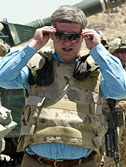 “Your country as much as this country,” Prime Minister Stephen Harper told Canada’s brave soldiers, during his latest surprise visit to Afghanistan, “owes you a debt of gratitude and its unwavering support.” And with these words he summarized for some Canadians why he does not deserve to win a majority government in the next federal election. For other Canadians, no doubt, the same words are just the simple truth. But most of them already voted for Mr. Harper’s new Conservative Party in the last federal election. What he needs now are more of the voters who see such words as the same militarist fear-mongering that has stained George W. Bush’s prosecution of his Iraq war. Mr. Harper won’t get what he needs this way, no matter how many Liberal budgets he concocts. Why such a smart politician does not understand this remains one great mystery of Canadian politics today.
“Your country as much as this country,” Prime Minister Stephen Harper told Canada’s brave soldiers, during his latest surprise visit to Afghanistan, “owes you a debt of gratitude and its unwavering support.” And with these words he summarized for some Canadians why he does not deserve to win a majority government in the next federal election. For other Canadians, no doubt, the same words are just the simple truth. But most of them already voted for Mr. Harper’s new Conservative Party in the last federal election. What he needs now are more of the voters who see such words as the same militarist fear-mongering that has stained George W. Bush’s prosecution of his Iraq war. Mr. Harper won’t get what he needs this way, no matter how many Liberal budgets he concocts. Why such a smart politician does not understand this remains one great mystery of Canadian politics today.
What is going on in Afghanistan right now anyway?
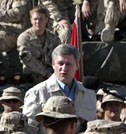 Canadian regionalism being what it is, on Wednesday, May 23 there were some notable variations in the coverage of Mr. Harper’s surprise Afghanistan visit, on the websites of leading newspapers across the country.
Canadian regionalism being what it is, on Wednesday, May 23 there were some notable variations in the coverage of Mr. Harper’s surprise Afghanistan visit, on the websites of leading newspapers across the country.
The story was at most underplayed in both the Vancouver Sun and the Calgary Herald (though Don Martin did have a column in the Herald, full of healthy cynicism and entitled “Kandahar offers refuge from all the flak at home”). Both the Globe and Mail and the Toronto Star had more prominent and extensive coverage. Le Devoir ran a somewhat less prominent but still quite noticeable item. The Halifax Chronicle-Herald, which always has a pronounced local tilt, at least featured a video of Mr. Harper in Afghanistan towards the bottom of its main web page.
Thomas Walkom also had an especially interesting column in the Toronto Star, which urged that: “Prime Minister Stephen Harper’s surprise trip to Kabul is not just a photo op for domestic Canadian consumption. It’s part of a concerted effort by the US and its NATO allies to stiffen the spine of President Hamid Karzai and forestall growing sentiment in Afghanistan for a political settlement with the Taliban.”
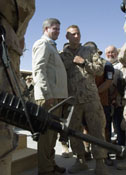 Walkom went on: “Afghans themselves are increasingly restive about the presence of foreign troops in their country especially when those troops kill civilians … Two weeks ago, the Afghan parliament’s upper house voted to end offensive military operations and enter into direct talks with the hard-line Islamists … The lower house has not yet decided whether to support this move. But in March, it passed another controversial bill promoting national reconciliation that would grant all warring factions, including the Taliban, immunity from prosecution.”
Walkom went on: “Afghans themselves are increasingly restive about the presence of foreign troops in their country especially when those troops kill civilians … Two weeks ago, the Afghan parliament’s upper house voted to end offensive military operations and enter into direct talks with the hard-line Islamists … The lower house has not yet decided whether to support this move. But in March, it passed another controversial bill promoting national reconciliation that would grant all warring factions, including the Taliban, immunity from prosecution.”
In this context, Harper’s May 2007 Afghanistan visit “came the day after US President George W. Bush and NATO Secretary General Jaap de Hoop Scheffer met in Texas to underscore the need for a united front against the Taliban that includes reconstruction as well as military action.” As James Travers wrote in the Toronto Star on May 24 “Harper’s second Afghanistan trip” was “markedly different from the first … Gone is jarring US jingoism, replaced by a typically more modest and soothing Ottawa narrative about helping the country to build a democratic, economically viable future of lasting peace and prosperity.'”
Well, some will say, the most blatant jingoism may have gone. But for many the militarist fear-mongering is still there – as in “Your country … owes you … its unwavering support.” The implication is still that the country also owes Mr. Harper’s policy choices on Afghanistan and the Canadian military its unwavering support too. And this is the kind of talk that still annoys many voters, and puts limits on the Conservative poll numbers. Even or especially with brave Canadian soldiers risking their lives in Afghanistan, Canada remains a “free and democratic society” first and foremost, as the Constitution Act 1982 so nicely puts it. The Canadian people do not owe Mr. Harper or his government anything. He has to earn public support.
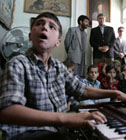 You earn public support of course with what your domestic electorate sees as credible policies. And the latest news from Afghanistan continues to raise suspicions among many Canadians that the current Afghanistan policy of US President George W. Bush and NATO Secretary General Jaap de Hoop Scheffer – which Mr. Harper seems so determined to follow almost blindly – lacks serious credibility, even if it does now more prominently include “reconstruction as well as military action.” (In theory at least. Just how sketchy “reconstruction” still is down on the ground was illustrated in a recent PBS TV documentary in the USA, which seemed to make very clear just how hard and even impossible it is for Canadian forces in southern Afghanistan to implement the grand designs for “a democratic, economically viable future of lasting peace and prosperity” devised by politicians, working in big offices far away from the battle fields.)
You earn public support of course with what your domestic electorate sees as credible policies. And the latest news from Afghanistan continues to raise suspicions among many Canadians that the current Afghanistan policy of US President George W. Bush and NATO Secretary General Jaap de Hoop Scheffer – which Mr. Harper seems so determined to follow almost blindly – lacks serious credibility, even if it does now more prominently include “reconstruction as well as military action.” (In theory at least. Just how sketchy “reconstruction” still is down on the ground was illustrated in a recent PBS TV documentary in the USA, which seemed to make very clear just how hard and even impossible it is for Canadian forces in southern Afghanistan to implement the grand designs for “a democratic, economically viable future of lasting peace and prosperity” devised by politicians, working in big offices far away from the battle fields.)
At the bottom of everything, the trouble still does seem to be that, going on six years after the 9/11 disaster, the policy of the US and NATO in Afghanistan has degenerated into something that looks a little too much like the long discredited policies of western imperialism in the same region of the global village. And even the Canada that was once a more or less proud part of the empire on which the sun never dared to set has a long tradition of scepticism here. Note, e.g., what was reported more than 115 years ago by the British historian Goldwin Smith, who spent the later years of his life as “the Sage of the Grange” in Toronto: “The Conservative leader in Canada has intimated that the Colony will help the mother country only in case of defensive war; and he evidently did not regard as defensive the war in Afghanistan.”
And what is going on in Canadian federal politics?
 Too many echoes of old empires and imperialisms may also have at least something to do with Stephen Harper’s more strictly Canadian domestic troubles, as spring 2007 starts to give way to the good old summertime – when even many people in Ottawa lose interest in federal politics.
Too many echoes of old empires and imperialisms may also have at least something to do with Stephen Harper’s more strictly Canadian domestic troubles, as spring 2007 starts to give way to the good old summertime – when even many people in Ottawa lose interest in federal politics.
Geoffrey Stevens, the former Ottawa columnist and managing editor of the Globe and Mail, who now writes for the Ottawa Valley e-magazine Straight Goods, summarized Mr. Harper’s current troubles aptly enough about a week and a half ago: “The Conservatives seemed to have a very clear idea of where they were going, or wanted to go, when they were elected in January 2006. They had their five priorities,” which “were their compass, their road map, through the campaign and early months in office … Then they lost their compass. They began to flounder. Perhaps the learning curve was too steep. Modern government is complicated, issues are never black and white, and 13 years in opposition is no preparation for managing a $200-billion-a-year enterprise. The Harper cabinet lacked experience and expertise.”
 On this understanding of things, it is certainly possible that Mr. Harper and his colleagues will forge a new compass and find their way again. They just need to take better account of the experience and expertise they have gained over the past 16 months and re-group. And once the House goes on its extended summer vacation they will have an opportunity to do just that.
On this understanding of things, it is certainly possible that Mr. Harper and his colleagues will forge a new compass and find their way again. They just need to take better account of the experience and expertise they have gained over the past 16 months and re-group. And once the House goes on its extended summer vacation they will have an opportunity to do just that.
But lately you also get the feeling that Mr. Harper’s troubles finally go deeper than this. He himself, it sometimes seems, is both a much-needed agent of change in the Canadian federation today, and a retrogressive voice from the past. And that may finally be why he and his new Conservatives have not (in the words of Geoffrey Stephens again) been “able to take advantage of the disarray in the opposition parties to lift their own popular support into majority-government range.”
 One thing Mr. Harper still has on his side is his status as the man from the new west, whose “Oil and gas boom fuels Canadian economy, job growth.” Many Canadians nowadays even in a place like Toronto have relatives or friends who have recently moved to Calgary, or some other part of Alberta – or even to Canada’s Pacific Coast in BC, which both basks in the reflected glory just over the mountains and has (some will say even brighter) charms and energies of its own. Even back east, Stephen Harper, who grew up in suburban Toronto and then moved to Calgary as a young man, symbolizes this suddenly very dynamic early 21st century revival of the now quite ancient Canadian resource economy, that began with the transcontinental fur trade and all that.
One thing Mr. Harper still has on his side is his status as the man from the new west, whose “Oil and gas boom fuels Canadian economy, job growth.” Many Canadians nowadays even in a place like Toronto have relatives or friends who have recently moved to Calgary, or some other part of Alberta – or even to Canada’s Pacific Coast in BC, which both basks in the reflected glory just over the mountains and has (some will say even brighter) charms and energies of its own. Even back east, Stephen Harper, who grew up in suburban Toronto and then moved to Calgary as a young man, symbolizes this suddenly very dynamic early 21st century revival of the now quite ancient Canadian resource economy, that began with the transcontinental fur trade and all that.
Theoretically, Stephen Harper as the man who brought the west into its own in Ottawa at last could have an appeal that transcends raw oil and gas economics as well. Even back east Mr. Harper’s Conservatives do have 9 seats in Atlantic Canada, 10 in Quebec, and 40 in Ontario. Even in Ontario, believe it or not, there really are voters who see themselves as Canadians first – and who suspect that the new west just may have the right kind of youthful and forward-looking leadership the country needs today. Mr. Harper’s Conservatives pressed this button very nicely with their “Stand Up for Canada” rhetoric in the 20052006 campaign. (It was a slogan that the old Ontario federal Liberal rainmaker Keith Davey might have dreamed up.)
 Now that the dust has had close to 16 months to settle, however, it seems to have become increasingly clear that the particular side of the new west Mr. Harper stands up for has a lot of the old Canada in it as well. (And even the very old Canada that was once a more or less proud part of the empire on which the sun never dared to set – as Mr. Harper couldn’t help letting slip during a visit to the old mother country last summer.)
Now that the dust has had close to 16 months to settle, however, it seems to have become increasingly clear that the particular side of the new west Mr. Harper stands up for has a lot of the old Canada in it as well. (And even the very old Canada that was once a more or less proud part of the empire on which the sun never dared to set – as Mr. Harper couldn’t help letting slip during a visit to the old mother country last summer.)
As it happens, this old Canada is one of the things that increasingly needs to be changed, or at least updated, in the Canadian federation of the early 21st century. And there may even in fact be more of this old Canada in Stephen Harper’s Alberta than there is in Ontario or even Nova Scotia. (Quebec as usual is always very mysterious about such things, especially if you don’t speak French. And its Canada is now very old indeed.)
 You can see something of all this in a recent issue of the new Harper Index e-bulletin, that the Straight Goods magazine Geoffrey Stephens now writes for has just launched. The people at Straight Goods, without any doubt, are no friends of Stephen Harper’s new Conservative Party of Canada. From their home in the Ottawa Valley they are still standing up for what might almost be called the old rural progressive political tradition in central Canada. (The kind of thing that long ago led to Ontario’s unique “Farmer-Labour” provincial government of 19191923, which almost no one in Ontario or anywhere else remembers nowadays, even though it really did happen.) But the interesting point is not that today’s Ottawa Valley progressives are attacking Stephen Harper. (Is the Pope Catholic after all?) It is what they are attacking him for – and just how they see him as most vulnerable.
You can see something of all this in a recent issue of the new Harper Index e-bulletin, that the Straight Goods magazine Geoffrey Stephens now writes for has just launched. The people at Straight Goods, without any doubt, are no friends of Stephen Harper’s new Conservative Party of Canada. From their home in the Ottawa Valley they are still standing up for what might almost be called the old rural progressive political tradition in central Canada. (The kind of thing that long ago led to Ontario’s unique “Farmer-Labour” provincial government of 19191923, which almost no one in Ontario or anywhere else remembers nowadays, even though it really did happen.) But the interesting point is not that today’s Ottawa Valley progressives are attacking Stephen Harper. (Is the Pope Catholic after all?) It is what they are attacking him for – and just how they see him as most vulnerable.
In this case (as with much recent noise in Parliament at Ottawa, which some say also led to Mr. Harper’s latest surprise visit to Afghanistan), the target is the “embattled defence minister” Gordon O’Connor, who is also a “former soldier and military industry lobbyist.” And if there is anyone in Ottawa today, some will say, who personifies the old Canada and all that needs changing and updating about it better than Mr. O’Connor, it is not easy to say just who it is. Yet Mr. Harper still seems determined to stand by Mr. O’Connor. Just as he seems almost quaintly determined to somehow revive an old British imperial military tradition in Canada, that has now lost most of the real social and cultural soil in which it once half-flourished.
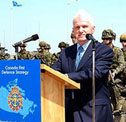 Without doubt, Canada does need to renew and update its military capacity in an increasingly dangerous 21st century global village. But here as elsewhere in the western world, it is increasingly clear as well that this is going to demand some genuinely fresh thinking, outside the box and much more in tune with dramatically new international realities. Canada had to go into Afghanistan when it did, in the immediate wake of 9/11. But that does not mean that we should still be there six or seven or eight years later, trying to do something we and all the rest of our international allies really do not know how to do.
Without doubt, Canada does need to renew and update its military capacity in an increasingly dangerous 21st century global village. But here as elsewhere in the western world, it is increasingly clear as well that this is going to demand some genuinely fresh thinking, outside the box and much more in tune with dramatically new international realities. Canada had to go into Afghanistan when it did, in the immediate wake of 9/11. But that does not mean that we should still be there six or seven or eight years later, trying to do something we and all the rest of our international allies really do not know how to do.
What our Canadian forces have learned in Afghanistan is a strong and courageous beginning for a much more effective definition and organization of Canada’s future military role. (And three cheers for all the troops who have done so well and sacrificed so much.) But does anyone imagine that Gordon O’Connor is going to lead anything of this sort? It is clearer and clearer that trying to reinvent the heroic world of Winston Churchill and the Battle of Britain is not going to work, in Afghanistan or anywhere else today. And even if he does not yet quite realize it himself, that is what Prime Minister Stephen Harper is asking us to do – or even just telling us must be done.
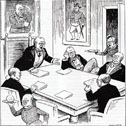 If you think about all this long enough, you also start remembering that Stephen Harper is not in fact the first Canadian prime minister from Calgary, Alberta. That honour belongs to The Right Honourable Richard Bedford Bennett, Conservative prime minister of Canada, 1930-1935. Like Mr. Harper, Mr. Bennett was not a native Western Canadian – though he went west from New Brunswick and not Toronto, Ontario. Mr. Bennett died as well, on June 26, 1947, in Mickleham, Surrey, England, and was buried in St. Michael’s Churchyard in Mickleham – the “only [Canadian] Prime Minister not buried in Canada.”
If you think about all this long enough, you also start remembering that Stephen Harper is not in fact the first Canadian prime minister from Calgary, Alberta. That honour belongs to The Right Honourable Richard Bedford Bennett, Conservative prime minister of Canada, 1930-1935. Like Mr. Harper, Mr. Bennett was not a native Western Canadian – though he went west from New Brunswick and not Toronto, Ontario. Mr. Bennett died as well, on June 26, 1947, in Mickleham, Surrey, England, and was buried in St. Michael’s Churchyard in Mickleham – the “only [Canadian] Prime Minister not buried in Canada.”
On this view Stephen Harper only descends from the Canadian prime minister who was defeated by William Lyon Mackenzie King in 1935 (granted that he also defeated Mr. King in 1930). And the alternative view that Mr. Harper – as Preston Manning has lately been trying to suggest – is actually a new Conservative reincarnation of Mackenzie King himself, about to give Canada a new kind of traditional governing party, that will rule for generations, is, well, looking rather dubious at the moment, at best.
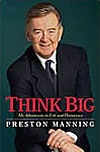 That at least is how things look right now. Maybe they will look quite different again by the end of the summer. Meanwhile, it’s time to crank up the barbecue and stop worrying about the bomb, for a few months at least. And, whatever else, it does also seem clear enough that Stephen will still be at least the minority prime minister of Canada for a while yet.
That at least is how things look right now. Maybe they will look quite different again by the end of the summer. Meanwhile, it’s time to crank up the barbecue and stop worrying about the bomb, for a few months at least. And, whatever else, it does also seem clear enough that Stephen will still be at least the minority prime minister of Canada for a while yet.

